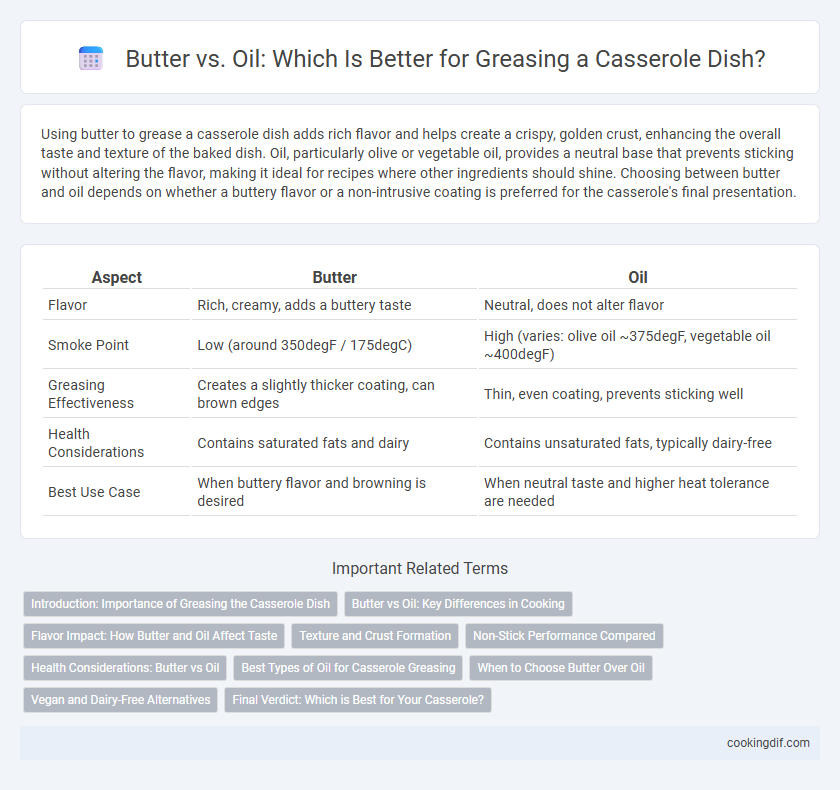Using butter to grease a casserole dish adds rich flavor and helps create a crispy, golden crust, enhancing the overall taste and texture of the baked dish. Oil, particularly olive or vegetable oil, provides a neutral base that prevents sticking without altering the flavor, making it ideal for recipes where other ingredients should shine. Choosing between butter and oil depends on whether a buttery flavor or a non-intrusive coating is preferred for the casserole's final presentation.
Table of Comparison
| Aspect | Butter | Oil |
|---|---|---|
| Flavor | Rich, creamy, adds a buttery taste | Neutral, does not alter flavor |
| Smoke Point | Low (around 350degF / 175degC) | High (varies: olive oil ~375degF, vegetable oil ~400degF) |
| Greasing Effectiveness | Creates a slightly thicker coating, can brown edges | Thin, even coating, prevents sticking well |
| Health Considerations | Contains saturated fats and dairy | Contains unsaturated fats, typically dairy-free |
| Best Use Case | When buttery flavor and browning is desired | When neutral taste and higher heat tolerance are needed |
Introduction: Importance of Greasing the Casserole Dish
Greasing the casserole dish with butter or oil prevents sticking, ensuring a crisp, golden crust and easy serving. Butter imparts rich flavor and promotes browning due to its milk solids, while oil provides a neutral taste and higher smoke point for even cooking. Choosing the right grease enhances texture, flavor, and overall presentation of the casserole.
Butter vs Oil: Key Differences in Cooking
Butter imparts a rich, creamy flavor and helps create a golden, crispy crust on casseroles, making it ideal for dishes where taste and texture are prioritized. Oil offers a higher smoke point and a neutral taste, which prevents burning and allows the natural flavors of ingredients to shine. Choosing between butter and oil for greasing a casserole dish depends on whether flavor enhancement or heat stability is more important for the recipe.
Flavor Impact: How Butter and Oil Affect Taste
Butter imparts a rich, creamy flavor and a slight nuttiness that enhances the overall taste of casseroles, contributing to a more indulgent mouthfeel. Oil, especially neutral oils like canola or vegetable, offers a subtle, clean taste that allows the primary ingredients' flavors to shine without alteration. Choosing butter elevates the dish's savory profile, while oil provides a lighter base ideal for delicate or vegetable-focused casseroles.
Texture and Crust Formation
Butter creates a richer, more flavorful crust with a slightly crisp texture due to its milk solids caramelizing during baking. Oil provides a smoother, more even coating that promotes a tender texture and prevents sticking without adding extra flavor. Choosing butter enhances crust browning and crunch, while oil ensures consistent moisture and softness in the casserole's exterior.
Non-Stick Performance Compared
Butter provides a rich flavor and creates a slightly crispy edge, but it can burn at high temperatures, potentially reducing non-stick performance. Oil, especially vegetable or olive oil, offers superior heat stability and a more consistent non-stick coating, preventing food from sticking effectively. For optimal casserole greasing, oil ensures reliable release and easier cleanup, maintaining the dish's integrity during baking.
Health Considerations: Butter vs Oil
Butter contains saturated fats that may raise LDL cholesterol levels, while oils like olive or canola offer healthier unsaturated fats that support heart health. Choosing oil for greasing casserole dishes reduces the intake of trans fats and promotes better cardiovascular outcomes. For a balanced diet, using oils with high smoke points ensures health benefits without compromising flavor or cooking performance.
Best Types of Oil for Casserole Greasing
Choosing the best oil for greasing a casserole dish depends on smoke point and flavor profile, with olive oil and avocado oil being top options due to their high smoke points and health benefits. Light oils like canola or grapeseed provide a neutral taste that doesn't overpower the casserole's flavors while preventing sticking effectively. Butter offers richness but can burn at high temperatures, making oils preferable for even greasing and a crispy, golden crust.
When to Choose Butter Over Oil
Butter is ideal for greasing casserole dishes when a rich, creamy flavor and a slightly browned, crispy texture are desired, especially in baked pasta or potato casseroles. It enhances the dish's aroma and helps create a golden crust due to its milk solids caramelizing during baking. Choose butter over oil when the recipe benefits from added depth in taste and a more indulgent finish.
Vegan and Dairy-Free Alternatives
To achieve a dairy-free and vegan casserole, oils like coconut, avocado, or olive oil are optimal for greasing the dish, offering moisture without animal products. Vegan butter alternatives, often made from plant-based oils like sunflower or canola, provide a buttery flavor while maintaining a completely dairy-free profile. Choosing oils or plant-based spreads ensures the casserole remains moist and flavorful, aligning with vegan dietary requirements.
Final Verdict: Which is Best for Your Casserole?
Butter provides a richer flavor and helps create a golden, crispy edge on casseroles, enhancing the overall taste and texture. Oil offers a neutral taste and evenly coats the dish, preventing sticking without overpowering other flavors. For casseroles that benefit from added richness and browning, butter is best; for health-conscious or light recipes, oil is the preferred choice.
Butter vs oil for greasing the dish Infographic

 cookingdif.com
cookingdif.com